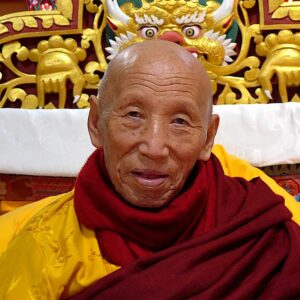What does it mean to be weak? Can we remain without any distraction in meditation for even five or ten seconds? In these two audio teachings, Phakchok Rinpoche asks us some difficult questions about the state of our minds.
Lion or Dog?
What does it mean to be like a lion instead of a dog? How do we learn to look at our mind, our experiences?
Listen to the Audio I
Stop Chasing!
Rinpoche points out here that we continually chase after external things. Instead, what might we do? We can turn inwardly—look inside and see how our thoughts naturally dissolve. Why are our minds not happy? And why are all our outer circumstances quite good, and yet we feel anxious? Why do we embrace suffering and worry? Our wish (to be happy) and our actions are in total opposition.
Listen to the Audio II
More Resources to Support Your Practice
The Path of Meditation
Rinpoche instructs us to drop our chasing after external distractions. Instead, he encourages us to look inward, at our own mind. This instruction corresponds directly to the meditation practices taught in the Mahamudra system. Again and again, throughout Samye Institute’s Path of Meditation course, we will hear Rinpoche advise us how to look inwards and watch thoughts dissolve naturally.
We can follow these pith instructions so as to become like lions instead of like dogs. The on-line course on The Path of Meditation is designed for self-study and will help us to avoid sinking into unhappiness and dissatisfaction.
Click here for more information on The Path of Meditation
Radically Happy Resources
Radically Happy: A User’s Guide to the Mind was co-authored by Phakchok Rinpoche and Erric Solomon. This accessible book offers the reader an introduction to some of the most profound Buddhist insights and practices in a handy, concise, and secular way.
Please also browse our Radically Happy Archive for other pith instructions for working with our minds.
Student Group Forums and Support
Don’t forget, the Samye platform features a number of student forums and groups that contain discussion, practice materials and a community of experienced practitioners towards which you can direct your questions. Please use these forums to post your thoughts about the videos and to engage in meaningful conversation with your world-wide Sangha brothers and sisters.
Please click here to access the online groups
(you must be logged in to view)










Responses